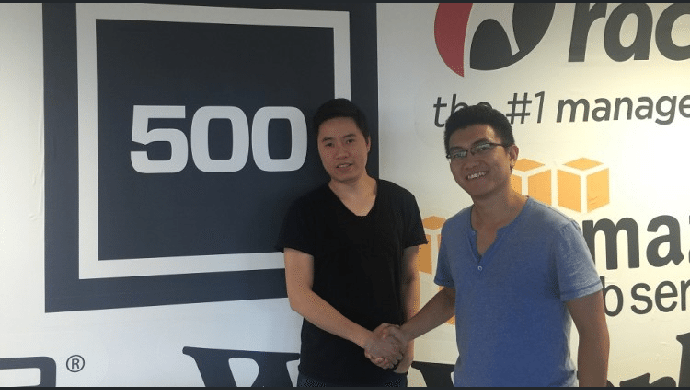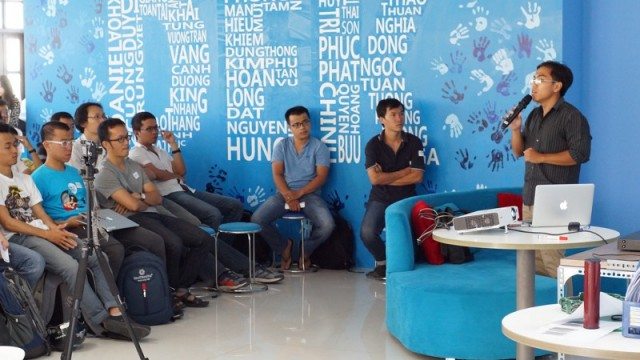
Quan Truong (light blue T-shirt), CEO and Co-founder of Beeketing
Vietnam has been long known to be one of the world’s top software outsourcing centres for large companies in the US, Europe, and Japan. That’s the old Vietnam. In this post, I will cover the new Vietnam.
In the past couple of years, I have experienced a new class of startups built by young Vietnamese founders with engineering backgrounds. Some of them have gained a certain level of success.
Grokking, a Vietnamese software engineer support organisation has nailed the vision – one which I have completely bought into.
The Grokking team believes that Vietnam would become a tech-hub not only in Southeast Asia but also in Asia and the world in the future. And we would be eager to become a part of the big bright vision.
Trung Hoang, co-founder and CEO of Lozi — a discovery platform for Vietnamese food lovers — is an example of why I believe the Grokking mission statement.
When I first met Trung in Singapore, I was impressed with his grit when he pitched his vision to some 30 developers in order to recruit a tech co-founder for joining his startup.
In 2012, Trung dropped out after spending a year of study at the Korea Advanced Institute of Science and Technology to go back to Vietnam and launch his own startup. Late 2015, Lozi scored a 7-digit funding round from Golden Gate Ventures. Trung was nominated as one of the Forbes 30-under-30 2016 Vietnam recipients.
Quan Truong is another example of an engineering-entrepreneur. Quan is the CEO and co-founder of Beeketing, a platform of marketing apps that focuses on increasing sales and conversion rates. Prior to Beeketing, Quan started an outsourcing company while he was still in university.
Late 2014, he participated in the early-stage pre-accelerator Founder Institute Hanoi and started Beeketing. The company is one of the very few rare cases of startups founded in Vietnam by Vietnamese and incubated by 500 Startups in the Valley.
Besides these two examples of Vietnamese founders with backgrounds in engineering, I also come across more and more Vietnamese engineers holding key roles at tech startups in Singapore.
Lately, some of the renowned Singapore-based tech startups such as Grab, Garena, HonestBee have been driving recruiting campaigns to bring engineers from Vietnam to work in Singapore. Therefore, Vietnamese engineers are becoming an important part of the workforce, particularly in contributing to the success of Singapore-based companies.
Challenges hindering the talent pool of Vietnamese engineers
However, the promising opportunity of tech talent pool in Vietnam also has key challenges.
I have done a number of conversations with employers both in Vietnam and Singapore who have hired Vietnamese engineers to nail down the problems.
Communication skills. The first problem lies with weak English communication skills among the majority of Vietnamese engineers. The curriculum of software engineering, among other disciplines, at most of the universities in Vietnam is still carried out in Vietnamese.
That forces students to invest their own time and money into picking up English skills if they can afford it.
But many Vietnamese who pursue engineering degrees come from low-income family backgrounds and therefore could not afford English lessons.
There was a case with a talented engineering student who failed an internship interview at Google because he could not understand what the interviewer was saying. In today’s modern world, English is considered as a passport for building a good career path at an international level. Weak English skills have taken away many opportunities from Vietnamese engineers and founders alike.
Soft skills. The next challenge involves weak soft skills, including presentation skills, teamwork spirit, interpersonal skills and the like, among the majority of Vietnamese developers.
From what I recall from my time training in Vietnam before, there was neither a subject nor extra-curriculum activities to build up these skills among engineering students.
Tech employers in Vietnam typically require engineering graduates to go through a training period of about three to six months before they can fully participate in the company. Usually, it’s only the students who have already done a few internships during their formal education perform better in those aspects.
I once observed a Vietnamese engineering-founder struggle to pitch about his startup in English at the Tag.pass Watson accelerator programme in Singapore. His product was a platform that connected native language trainers (including English trainers) with students. It seemed really ironic to me.
Culture and team dynamics. Another problem lies with the culture. Vietnamese engineers can work efficiently alone or in a small team, but when it comes to working with a larger team, it is really hard for them to get along well, in order to produce better output.
Long-term planning. The problem comes next is short-sighted planning for career paths. I had a conversation lately with a Viet Kieu (overseas Vietnamese) who is a Canadian expat but originally born in Vietnam. He had been building a small tech team out of Saigon for a year. He shared with me that one of his engineers was willing to move to another company because the engineer was offered a US$50 salary difference.
He pointed out that Vietnamese engineers — at least those who are working for him — are not willing to take these risks and think of the box.
In another conversation with a Singaporean entrepreneur who built a tech team of 20 developers in Saigon, I was told that it is very common to encounter CVs of developers who change jobs every single year. Somehow, he has fostered a good company culture, which helps retain developers. Although some of his developers get better offers by other companies, they still want to continue working for him.
As someone who used to live in that situation, I could say on behalf of the majority of Vietnamese software developers that we do not know how to get ourselves ready for a good starting salary right after graduation. To compensate for this, we tend to job hop frequently in order to negotiate a higher salary.
Perhaps foreign employers in Vietnam are not willing to pay higher. They still consider Vietnam as a good place to produce cheap software developers. It is very common to come across Vietnamese developers working on a couple of side projects to earn extra money. That factor has also distracted them from focusing on their main job in order to build up their career path.
Brain drain. Lastly, a lot of talented Vietnamese engineers have left the country to work in developed countries such as the US, Australia, Japan, Singapore, and in Europe.
Thus, once foreign companies come in to set up tech teams in Vietnam, it becomes really hard to find senior engineers with great experience in engineering and leadership skills. However, I have observed some employers working around this problem by assigning Vietnamese engineers to work in Singapore for some years then sending the engineer back home to lead the local team.
We have good hopes
With the challenges highlighted, I have observed a pay-it-forward culture from the grassroots communities for developers such as Grokking, TechSoup, GeekyWeekend.
Grokking and GeekyWeekend are organised by engineers who share the common denominator of having worked in Singapore. Therefore they have injected a certain level of vibrancy to the local tech community in Saigon.
Grokking has been organising high-quality tech talk events every month since 2014. The talks include speakers who are senior engineers from companies both in Vietnam and overseas. They share their knowledge on important topics of software engineering and tech product development. Lately, they are venturing into skill acceleration for engineers by putting together an eight-week long big data bootcamp.

A Grokking talk event
Meanwhile, TechSoup is active in hosting monthly events with speakers to discuss different aspects of soft skills and interpersonal skills. These are targeted at helping engineers grow and excel in their career path. On October 23rd, I am bringing some friends who help recruit engineers for tech startups in Singapore to speak at the TechSoup event.
GeekyWeekend has also been hosting weekly meetups every Saturday since September 2016. These meetups are a mix of Grokking’s and Techsoup’s, in they way that they hold different mini talks covering tech and career development topics for engineers.
With support at the grassroots level, I humbly expect to see more and more Vietnamese engineers with a strong foundation in both tech and soft skills in the years to come.
—-
Son Le Thanh is Vietnamese. He got his bachelor’s degree in computer science from the National University of Vietnam, Ho Chi Minh City in 2003 and master degree in software engineering from National University of Singapore in 2010. After graduation in Vietnam, he worked for local companies for three years. In 2006, he made his way to Singapore and have been staying in the sunny island since then.
In June 2012, Son made his foray into the Singapore startup scene by kicking off the Startup Grind community after an exploration trip to Silicon Valley. Since then, he has made regular trips back home to Vietnam, as well as interacted with various kinds of entrepreneurs in Singapore. In the past three years, Son helped a couple of startups in Singapore get their products built by individual developers or digital agencies in Vietnam.
The views expressed here are of the author’s, and e27 may not necessarily subscribe to them. e27 invites members from Asia’s tech industry and startup community to share their honest opinions and expert knowledge with our readers. If you are interested in sharing your point of view, submit your article here.
The post The hard truth about Vietnam’s software engineering industry appeared first on e27.